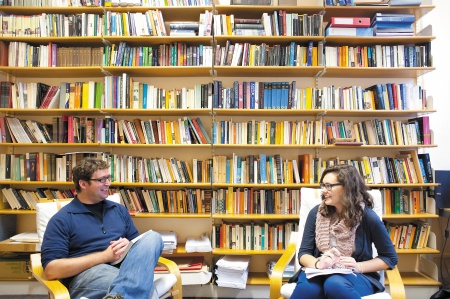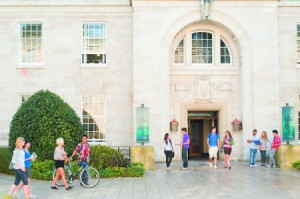
February 11, 2015, by Teaching at Nottingham
Unique Support for First Year English Students
Exploring the Academic Community module in the School of English
From treasure hunts in the Hallward Library to discussions about how best to resolve a health crisis in student halls of residence, the School of English’s first year ‘Academic Community’ module offers a grounding in the ethos of academic life and an invitation to participate in a community of English scholars at the University Of Nottingham.
Flagged during its recent Teaching and Learning Review as an outstanding element of the School’s provision, and unique within the University, the Academic Community module encourages students to explore key themes and concepts within the discipline, as well as helping to develop the academic, social and communication skills required to get the most out of academic life. As Professor Charles Crook, Chair of the panel which oversaw the recent TLR, explains, the feedback from students during the Review was overwhelmingly positive: “When we spoke to the students, the Academic Community module was the thing they spoke most enthusiastically about… When we came to write up the report it was the natural thing to identify.”
As a mandatory component of the single honours English programme, the Academic Community module uses the Autumn term to introduce students to the basics of studying English at University; the sections of the School (Medieval Literature, Literature 1500-present, Drama, Linguistics and Creative Writing) are explained and explored, as are the practicalities of academic life, such as essay writing and academic authority. Spring term brings a more concept-led approach, introducing students to the themes and ideas – such as interpretation, originality, audience, the reader – which will go on to underpin much of their work in the years that follow. As Dr Rebekah Scott, module convenor, explains, the Academic Community module is not simply a way of inducting students to the School, but also enables staff to ensure that all first year students are on something like an equal footing:
“I think some of the students have been given an idea of what to expect at University level, but others haven’t. The problem we as tutors perennially face is a disparity between those students who are exceptionally well-prepared and those who are less so; how do you make it more of a level playing field? You need to have a course like this, where we’re all on the same page, talking the same language about these terms, the skills they need, how to make the transition from A-Level to university. If we go back to the starting point for everything, and make sure we get the same message out to everyone in a foundational module, it gives confidence to those students who already know what they’re doing and it really helps those who are less well-equipped.”
Whilst the structure of the course is consistent across each semester – regular lectures supported by small group tutorial meetings – the success of the module pivots on its flexibility and responsiveness in terms of its content. Whereas seminars can contain up to twenty students, tutorial sessions for the Academic Community module will typically include between four and seven students only. The sessions are based around recommended tasks which often form the basis of broader, informal conversations; allowing students to lead the discussions offers an opportunity to build confidence and experience peer feedback, but also enables tutors a valuable insight into the personal, academic and intellectual issues of the moment, as Rebekah notes:
“It’s an ‘informal’ way of formalising regular contact with the students; we’re not necessarily talking about pastoral things but if they do arise we can address them. We also get a sense of what their intellectual interests are, giving us a more complete picture – what they’ve been reading, what animates them, what interests them… I can hear which topics are ‘trending’ just in this tutorial office once a fortnight.”
Academic Community sessions don’t just afford students the opportunity to get to know staff in a less formal context (tea and biscuits are provided to help the atmosphere feel homely) and gain access to a society of like-minded scholars with many different areas of expertise, but can facilitate a sense of community amongst the students themselves at an even more basic level:
“Often the problems they’re having relate to being unsure if other people feel isolated or are missing home” explains Rebekah. “They can often resolve their own issues amongst themselves better than I could by seeing them individually.”
Of course, as well a focus on openness, communication and confidence-building, the Academic Community module is designed to help first year undergraduates to develop and hone the skills necessary to excel in their English degrees; students are assessed on an oral presentation in early January (based on an exercise from one of the tutorials) and the completion of a portfolio, correctly referenced and presented, of four 500-word mini-essays, submitted in May. The practical application and utility of the themes and issues covered is a clear priority for Rebekah:
“Everything we’ve selected for inclusion on the course has good practical application – I think in the past that’s something we might not have been doing quite well enough; some weeks would be rather dry and content-heavy and there would be a lot for students to absorb without necessarily having a skill-based task that arose from it. So we’ve tried to blend practical and intellectual content and match this with skills- and ideas-based written tasks, and always to pair lectures with follow-up seminars… This is what the students themselves said they liked and wanted, and I think a course like this has to be responsive to what the students want.”
 It is this responsivity and flexibility that helps the Academic Community module to offer such tailored support to first year students, but this flexibility is as much a product of circumstance as of design. Staff undertake lectures for the course on a voluntary basis; lecture slots are readily filled, as they represent a valuable opportunity to introduce new students to the range of areas within the School, but as staff come and go so too the Academic Community module grows and changes in response.
It is this responsivity and flexibility that helps the Academic Community module to offer such tailored support to first year students, but this flexibility is as much a product of circumstance as of design. Staff undertake lectures for the course on a voluntary basis; lecture slots are readily filled, as they represent a valuable opportunity to introduce new students to the range of areas within the School, but as staff come and go so too the Academic Community module grows and changes in response.
Whilst the content of the Academic Community module is particular to English, the principles underpinning its centrality within the first year syllabus are far from unique to the School. As Professor Crook explains: “The strength of the module is that it’s community-building, and one of the constant critiques of the current academic pattern of teaching and learning is that it doesn’t always allow students to feel that they enter into a disciplinary community very fully.” It is clear from the glowing student feedback and warm appraisal within the School’s TLR that the Academic Community module represents an example of creative, sensitive and thoughtful good practice, allowing students the opportunity not only to develop their personal academic skills, but to feel part of a supportive community of peers and faculty in the process.
Based on an interview with Dr Rebecca Scott. For more on the Academic Community module, contact Dr Scott via the School of English.
For discussions on academic development, contact Dr Ruth Allen in the Teaching and Learning Directorate.
No comments yet, fill out a comment to be the first


Leave a Reply